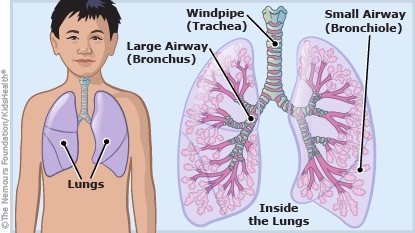Bronchitis is when the lining of airways in the lungs gets inflamed (red and swollen) and make more mucus than usual. This causes coughing that can last a few weeks. Bronchitis is usually caused by a virus but may also be caused by a bacteria. Bronchitis caused by a virus will get better on its own. For bronchitis caused by a bacteria, health care providers prescribe antibiotics.



Your child:

Your child:

What are the symptoms of bronchitis? The most common symptom of bronchitis is a cough. The cough may be dry or bring up thick mucus. A child with bronchitis might wheeze, feel short of breath, or have a rattling feeling in the chest. Kids also may have a mild fever, sore throat, headache, achiness, or tiredness.
Can bronchitis spread to others? Yes, bronchitis is contagious. It can spread:
To prevent spreading germs, remind your child to cough into a tissue or their elbow, not their hands. They should wash their hands with soap and water (or hand sanitizer) often, especially after coughing and sneezing.